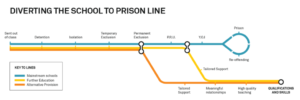In 2018, Catch22 responded to the ‘School to Prison Line’ campaign, which considered the impact that alternative provision (AP) can have on diverting a young person who is on the path to a prison/reoffending cycle:

In that blog, we focused on some of the less clear-cut reasons that a young person may find themselves on this “track”, and what other “lines” alternative provision can open up for them, as informed by our experience running alternative provision and special education schools.
The relationship between exclusions and offending is undeniable, with the Institute of Public Policy estimating that, of the 85,975 people in UK prisons, 54,164 had been excluded from school. However, exclusion is just one factor that can increase the likelihood a young person comes in contact with the criminal justice system: a 2019 report from Public Health England notes that the risk factors for offending behaviours “usually exist in clusters, not in isolation”. As such, it is not enough to focus on exclusions alone.
At Catch22, we deliver services across all points of the social welfare cycle, and across a broad range of settings – from prisons, to colleges, to community settings. In doing so, our teams innovate, share expertise, and work together across services and divisions to divert young people away from crime and subvert the statistics that obscure their potential:
Research shows: 100% of children involved in County Lines had been excluded from school.
Our teams find that, when child exploitation and missing from home services are commissioned together, they are more effective at identifying and managing risk. This is because missing incidences can provide a key indicator to exploitation. We also provide training to professionals and students to help them to spot the signs at the earliest opportunities.
Aided by knowledge from our child exploitation, gangs, and criminal justice teams, we work with commissioners to roll this model out more widely, to prevent incidences before young people become involved in the criminal justice system.
Research shows: Children who have been in the care system make up less than 1% of the general population, but 24% of the prison population.
In 2022, Lighthouse Pedagogy Trust opened its first care home in west London. Informed by social pedagogy, their aim is to create a place that young people can call home. We also seek to drive policy change from the inside, connecting over 80% of the UK’s Local Authority leaving care teams through the National Leaving Care Benchmarking Forum.
By providing young people in care with a safe, nurturing and empowering environment, we believe that we can divert them from poor education outcomes, homelessness, unemployment, mental health difficulties, and prison sentences.
Research shows: 29% of people in prison report having experienced abuse as a child, and 41% report having witnessed violence in the home – particularly for those who state that they had a family member with an alcohol or drug problem.
Our hope is, that by taking a whole-family approach, we will be able to break some of the intergenerational cycles that can increase the likelihood of a young person entering the criminal justice system.
Inclusion22 (part of Hampshire 24/7) is a dedicated service supporting and safeguarding children of substance misusing parents or carers, whilst Pause steps in to support women who face having two or more children removed from their care.
Where early interventional services are no longer suitable, we continue to provide support to break the reoffending cycle, for example through our Dependency and Recovery service which supports young people on probation with substance misuse challenges.
Research shows: Exposure to four or more adverse childhood experiences (ACEs) can make someone up to 11x more likely to be incarcerated than those who have experienced zero ACEs.
Individuals do not just require the removal of criminal activity from their lives but also the addition of a purpose and fulfilling activities to help them thrive.
We do this in a range of ways depending on the needs in the local area. For example, through more generalist services, such as The Hive, or as part of a more tailored approach such as that provided by LGE who have a partnership with the purpose-built Links Studios in Canning Town to develop young people through music. Suffolk Positive Futures is another example of a programme focused on diversionary activities, helping young people to find new opportunities through sports.
These services provide a safe space within which the young person can explore their passions and find their voice, away from illegal influences.
There can be clear indications that a young person is on a path towards criminal activity. Catch22 aims to intervene at every stage of this journey, delivering services that allow us to see the issues behind the statistics, such as a lack of support, opportunity, and positive role models.
Making the UK a safe place to grow up for all young people is a focus of our recent Manifesto. Too often in the policymaking process, adolescents are overlooked. By working with young people who, due to their circumstances, are at a heightened risk of falling into criminal behaviour, we believe that we can tackle these issues at the source. This will lead to:
- fewer victims experiencing harm or trauma,
- fewer perpetrators facing the challenges that entering the criminal justice system can bring,
- less pressure on an increasingly costly and overcrowded criminal justice system, and
- a society in which more people have access to good people around them, a safe place to live, and a purpose in life.



